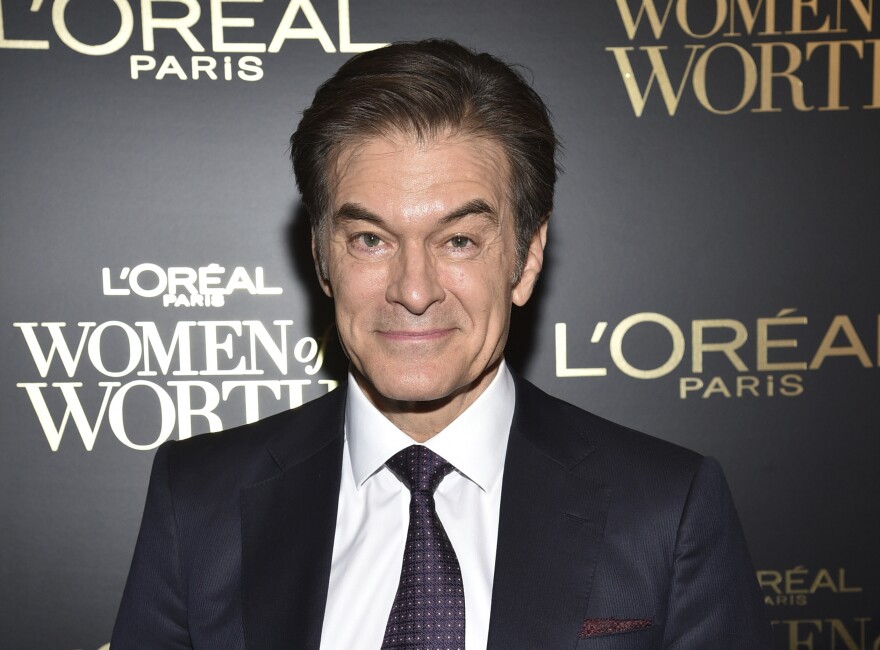Dr. Mehmet Oz, of daytime talk show fame, officially announced his bid for U.S. Senate in Pennsylvania this week, saying he’s running because “America’s heart beat is in a code red in need of a defibrillator to shock it back to life.” But some say that while he does promote some fact-based medical practices — like getting vaccinated against COVID-19 — his years spent talking up pseudoscience treatments on TV should give Pennsylvanians pause.
“He has a certain charm,” said Joe Schwarcz, director for McGill University’s Office for Science and Society, which works to separate sense from nonsense and fact from myth. Schwarcz has followed Oz’s career for years.
“He sounds like he's reliable, he knows what he’s talking about. But it's this two-face thing: Some of the stuff he says is scientifically solid and then some isn't.”
Oz's approach to the coronavirus has itself been double-edged. He supports getting vaccinated against COVID. But soon after the pandemic hit, Oz repeatedly promoted taking hydroxychloroquine, a treatment that lacked scientific evidence but was touted for a time by then-President Donald Trump and his allies.
Schwarcz said that early on in Oz’s career, Oz did emphasize fact-based health practices, often as a guest on Oprah.
“He was quite good. He told people to exercise, he told people to eat broccoli,” Schwarcz said. But later on, he said, Oz began endorsing pseudoscientific treatment, like weight-loss treatments.
Among those Oz touted was a green coffee bean supplement. On his show about the extract, Oz said, “This miracle pill can burn fat fast for anyone who wants to lose weight.”
“Evidence, that's what I always look for,” Schwarcz said. “Is there any proper scientific evidence for whatever is being promoted? And certainly in the case of, the green coffee bean extract or raspberry Ketone and add the red palm oil and all of this? There just is no evidence. He’s kind of hyping simple solutions to complex problems, and the public just laps that up.”
In 2014, the researchers who conducted a study about the pills retracted their work. The company who made the supplements paid a $3.5 million settlement to the Federal Trade Commission. The FTC called the weight-loss claims baseless. Oz’s show later released a statement acknowledging that the study had been pulled and that more research needed to be done.
That same year, Oz faced scrutiny at a U.S. Senate hearing, when then Sen. Claire McCaskill somewhat famously told Oz “the scientific community is almost monolithic against you.”
But while many in the medical community have questioned Oz, Schwarcz said the doctor’s track record of promoting some science-based medical advice as well pseudoscience can make it difficult for non-experts to parse what’s true and what’s not.
“The general public is not adept at that, so they are at the mercy of whatever he says." And for experts, he said, it's hard "to deal with someone who you can point at the things that he's done, which are good," but which also can be "swallowed up by the nonsense.”
Dr. Lisa Parker is the director of the Center for Bioethics and Health Law at the University of Pittsburgh. She said because there’s so much information available on any topic, many people look to authority figures in a given field, like Oz, for guidance.
Oz is a cardiothoracic surgeon credited for the invention of a heart valve. He attended Harvard University and earned a joint MD and MBA at the University of Pennsylvania School of Medicine and Wharton Business School before becoming a surgeon.
But Parker said such credentials can lead to what bioethicists call “a generalization of expertise,” in which people assume that because someone is an expert in one area, they also have expertise in another.
“I think that's one of the concerns that we are seeing today with people who gained some notoriety in one field trying to use that celebrity to then gain prominence in another field in which they may or may not be well qualified,” she said.
Oz, she said, moved from “cardiothoracic surgery over to diet and wellness. And then also from TV celebrity to political governance — issues of legislation and the public interest. And so relying on celebrity to claim expertise is problematic.”
She said that as a physician, he has “gone out of his lane” by promoting products that are unrelated to his field.
“He's trading on his medical degree to attract viewers, to give them false credibility to what he is recommending on the show,” she said.
Parker cited research from the University of British Columbia and the University of Alberta, which looked at two medical advice shows, including Oz's. The study found that approximately half of the recommendations made on Oz’s show “lacked evidence or are contradicted by the best available evidence.”
Joe Schwarcz said he wishes Oz would use his platform to talk about fact-based, peer-reviewed research instead.
“It's a shame, because he's got the platform to do good science and there's no shortage of good stuff to talk about,” Schwarcz said. “There is legitimate science that he could be addressing and clarifying and steer people in the right direction instead of promoting useless supplements and talking to the dead.”




